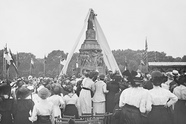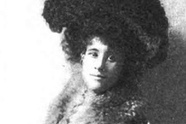The Roundup Top Ten for May 12, 2023

Arlington Cemetery Will Remove its Racist Confederate Monument; Some Won't Let it Goby Erin L. ThompsonThe Arlington Confederate Memorial, according to a Defense Department review, mythologizes history so severely that no contextualizing signage could overcome its embodiment of the Lost Cause myths that justified Jim Crow. Some adherents of that myth are mad. |

Faculty and Librarians Must be Allies in the Fight to Save Higher Edby Emily Drabinski"A robust defense of free expression requires an equally vociferous defense of the institutions where that speech is most widely celebrated. The fight for higher education must be a fight for the library as well." |

Americans Can and Must Fight Back Against Anti-Woke Authoritariansby Khalil Gibran MuhammadSigns are emerging that Americans won't be persuaded by moral panics to surrender the freedom to learn. What can this counteroffensive build on? |

Can Capitalism Exist Without Excess?by Trevor JacksonThe pandemic supply chain disruptions have focused attention on shortages, but the problem of gluts—of food being destroyed when it can't be profitably sold–reflects a deeper problem with global capitalism. |

Who's Afraid of a Black Cleopatra?by Gwen Nally and Mary Hamil GilbertThe controversy over the portrayal of Cleopatra by the Black British actress Adele James highlights the difficulty of reading modern ideas of race and identity back onto the past. But more interesting questions arise around why people in the present seek commonality with past figures. |

Why the French are Strikingby Moshik TemkinBrits and Americans commonly refer to French protests as a form of national sport, which obscures the serious retrenchment of the welfare state that President Macron is seeking to oppose, and trivializes opposition to the changes. |

Coke Money and the Public Relations of Higher Ed Divestment from Apartheidby Amanda Joyce HallAt Emory Univerity in the 1980s the close relationship between Coca Cola and the administration allowed Coke to leverage its financial support of the university to press the administration to suppress and coopt student movements for divestment from Apartheid South Africa. |

Onoto Watanna, the First Asian American Screenwriterby Ben RailtonUnder the pen name of Onoto Watanna, a woman named Winnifred Eaton of British and Chinese descent became a literary prodigy, penning romance novels, ethnic cookbooks, and screenplays—and a searing critique of the treatment of writers in Hollywood that rings true today. |
The Siege of Wounded Knee was a Beginning for Renewed Native Resistanceby Benjamin Hedin and Nick EstesMovement activists occupied the Wounded Knee site in 1973, in defiance of corrupt tribal leadership and federal authorities. Both the occupation and the massacre of Native people at the same place in 1890 had been cast as tragic endings. Native activists insist that they represent cultural and political rebirths. |

Washington State Law to Offer No-Interest Home Loans to Redress Decades of Discriminatory Housingby James GregorySpecific practices by private lenders and public authorities have created and perpetuated disparities in homeownership and wealth through real estate. Guided by researchers, Washington State is attempting to compensate for that harm. |